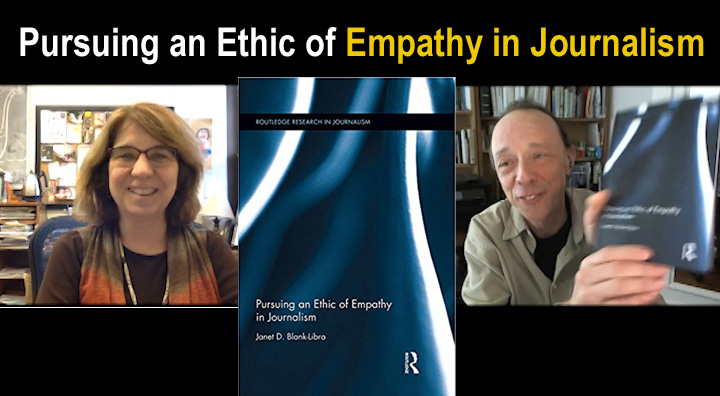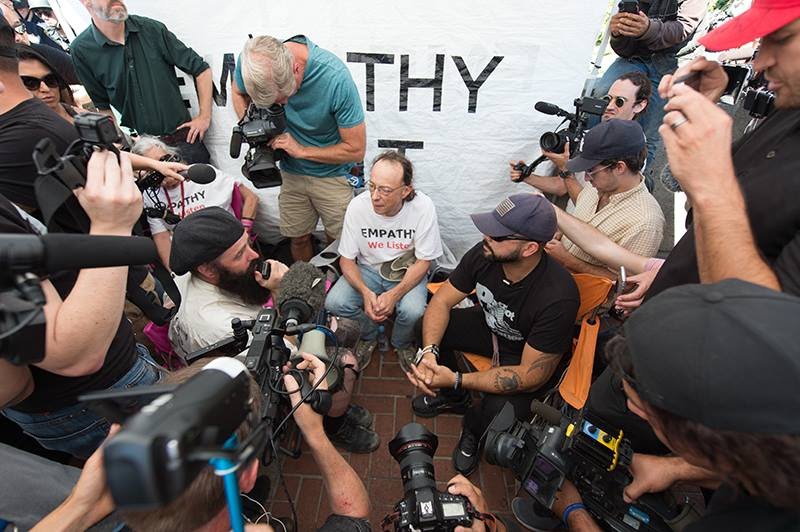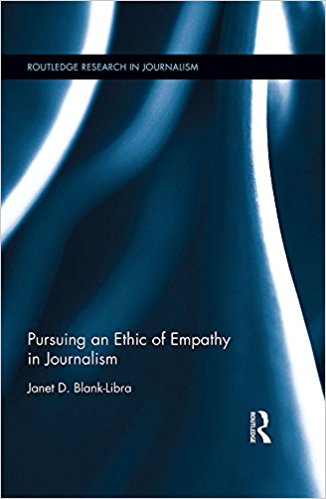|
|
|
Culture of Empathy Builder: Janet Blank-Libra
Links
Quotes
"Empathy remains
a largely unexplored possibility-in any deliberate sense-for reconciliation
among people of different faiths, cultures, countries, races, socioeconomic
groups, sexual orientations, political affiliations and more. Rather than
dismiss empathy's possibilities, we need to entertain the possibility that
empathy is an expansive way of being in the world that promotes depth of
humanity and and depth of understanding."
Janet Blank-Libra "It's time to
surrender: Journalism education should incorporate the study of empathy and
compassion alongside its study of the objective method. The objective reporter
who integrates into his or her work an empathetic, compassionate approach does
not face irreconcilable demands."
Janet Blank-Libra "When journalists practice an ethic of empathy and compassion, they do not forfeit their objectivity. Empathy seeks to understand the other, not produce agreement with the other. For this reason, empathy compels fair treatment of all sources." Janet Blank-Libra
Pursuing an Ethic of Empathy in Journalism
Table of Contents
Papers and Articles
Empathy compels fair treatment of sources
Empathize to Understand, Not to Agree
Journalism: Accepting the necessity of an ethic of empathy
"Journalism professor Dr. Janet Blank-Libra says there is an apparent disconnect between empathy and objectivity in the news media - and many journalists intentionally eschew empathy in an attempt to remain unbiased. It has even come to be seen as taboo in the media. Four Augustana students, however, are bringing the discussion of empathy into the light and are encouraging more journalists to use it to bring greater truth into their reporting. "I think using empathy in journalism is something that not enough people are talking - or even thinking - about, even though a lot of famous reporters are empathic," said Sophie Geister-Jones '18. They presented their own panel discussion, entitled "Reporting on the Vulnerable: Empathy as a Form of Inquiry," at the National College Media Convention in Dallas, Texas, in October. Geister-Jones, Jessica Ruf '19, Jacob Knutson '19, and Taylor Olson '18 presented the talk, which they began developing this summer."
My book: Pursuing an Ethic of Empathy in Journalism "When I started my book several years ago, I wanted to explore and think about the way journalists do their work in a world within which people are so often at odds. Journalists are trained to be objective, but the best of them bring to their work an ethic of empathy that allows for a more expansive route to understanding. The topic of empathy has not always been a political one.
Today, it is. In January 2018 the president of the United States called Haiti and the countries of Africa shit-holes. His racism, something he either deliberately or unwittingly reveals on a regular basis, precludes the possibility of his practicing empathy. It is more important than ever that we find ways to understand one another, that we see comments such as the president's for what they are.
Empathy remains a largely unexplored possibility-in any deliberate sense-for reconciliation among people of different faiths, cultures, countries, races, socioeconomic groups, sexual orientations, political affiliations and more. Rather than dismiss empathy's possibilities, we need to entertain the possibility that empathy is an expansive way of being in the world that promotes depth of humanity and and depth of understanding."
Compassion is not journalism's downfall, it's journalism's
salvation
"It's time to surrender: Journalism education should incorporate the study
of empathy and compassion alongside its study of the objective method. The
objective reporter who integrates into his or her work an empathetic,
compassionate approach does not face irreconcilable demands. The
compassionate act, one that seeks to alleviate suffering, often follows a
process that starts with empathy, i.e., the moment within which one
connects with the other in an effort to see through his or her eyes, to
know something through its meaning for that person. When journalists practice an ethic of empathy and compassion, they do not forfeit their objectivity. Empathy seeks to understand the other, not produce agreement with the other. For this reason, empathy compels fair treatment of all sources. Just as one should empathize with the poor person, he or she should empathize with the public official. For the journalist compelled by a moral compass, the writer who seeks justice in the world, empathy can make visible the lives of those who are marginalized and misunderstood and in so doing transform the act of reporting into an act of compassion."
Presentations
Fall 2013: "Emotional Accuracy: Practicing an Ethic of
Empathy." 92nd Annual National College Media Convention, New Orleans,
Oct. 23-Oct. 27
|
|
||||








